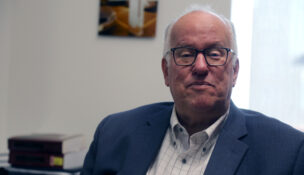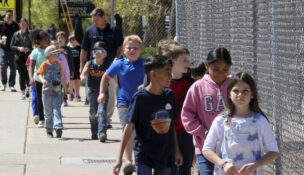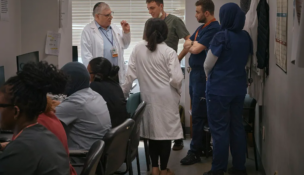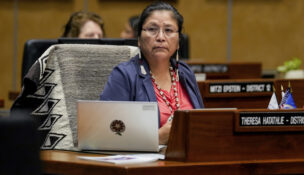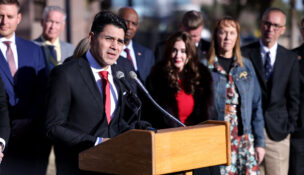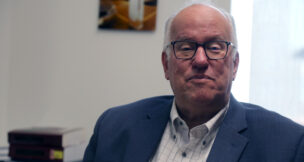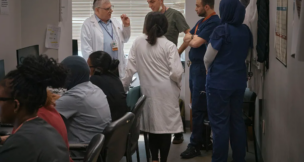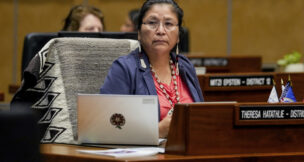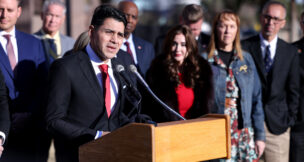Session Wrap: Gov. Hobbs on 2025’s victories and ongoing battles
Reagan Priest Arizona Capitol Times//July 20, 2025//
Session Wrap: Gov. Hobbs on 2025’s victories and ongoing battles
Reagan Priest Arizona Capitol Times//July 20, 2025//
Gov. Katie Hobbs managed to score legislative wins and sign a bipartisan budget during her third legislative session on the Ninth Floor, but not without lengthy battles with Republicans and a new veto record.
Hobbs sat down with the Arizona Capitol Times to recap what she calls a “very successful session” that saw movement on groundwater legislation, extended funding for individuals with developmental disabilities and the passage of a $17.6 billion budget.
But several issues were left on the table when lawmakers adjourned at the end of June, like school voucher reform, education funding and affordable housing initiatives. The governor hopes more can be done to address those areas when the Legislature reconvenes in 2026.
What do you consider your biggest wins of this session?
When we saved the funding for the developmentally disabled population, I think that set a really good tone for the budget. But in and of itself, it was a huge win. And we all watched these families come to the Capitol day after day, and the House Republicans refusing to give them a chance to speak in committee. I had a round table and just heard their stories. It was gut wrenching, and that’s why it was such a priority to save that program, and we did. I think my best day of the session was when we had that bill signing.
Some of your priorities weren’t addressed this session, which are you hoping to keep working on?
First of all, I’m really focused on what we did get done. If you look at the budget that we passed, and what I talked about in my State of the State — laying out the “Arizona Promise” — we covered a lot of those priorities. Giving state police and firefighters a much needed raise, continuing local border support and efforts on border security, investing in child care, Homes for Heroes. So there’s certainly a lot we can build on. Obviously, we didn’t get any reforms on ESAs, and that’s still going to be a priority, as well as getting a Prop. 123 to the voters that invests in public education and gives teachers a raise, I think that’s a huge priority. And then we have more to do on housing. Housing is a big one, and Low Income Housing Tax Credits. It was really unfortunate that we couldn’t get a champion there but we’re not giving up. And the rural groundwater reform is also still critical. I certainly am really proud of the work we did on the urban groundwater with the Ag-to-Urban bill, but making sure that we’re not taking that as a win and going away because rural groundwater is still a really critical issue.
What kind of changes are you hoping to see in the state’s ESA program?
Everything’s on the table. I think the plan we proposed this year was very reasonable, and something that even supporters of the program could get behind. We’re not trying to eliminate the program. We want it to go back to its original purpose and help kids with disabilities, kids in low-performing schools. The more reporting we see on the abuses, the more ammunition, for lack of a better word, it gives a reasonable proposal. It’s really mind boggling to me that Republicans want to continue to defend these abuses.
It seemed like groundwater was also going to go unaddressed this session, but the Ag-to-Urban bill came in at the last minute. What did it take to get that to the finish line?
I think it was having Senator (T.J.) Shope as the champion, and him being willing to usher that through. Last year, the bill that got to my desk … it was rushed through, and it wasn’t the right compromise. And so we came back to the table. The legislative process is always weird, and sometimes things just sail through, and sometimes they stop, and then at the end is when you see the flurry of activity. I’m really glad we got the compromise that worked to make this a good program, and I think it just took the leadership of Senator Shope to get it done.
A few of the bills you signed this session had Democratic opposition and aligned with policies proposed by conservative groups. What was the reasoning there?
I have focused on not looking at the partisan solutions, but things that are addressing problems. An example is the age verification for online content. I vetoed a similar bill last year, and I’ve heard from more and more parents who are really concerned about content that their kids are exposed to. And this seemed like the right balance, and I have no idea that it was possibly aligned with right-wing things. To me, it’s something that’s addressing an issue that a lot of parents are struggling with.
I have to ask about the veto record. Why do you feel like that isn’t the best way to measure your legislative effectiveness?
There was definitely an orchestrated attempt to run up the score on that veto record. Like I vetoed bills this year that I vetoed one or two times before, and nothing’s changed about the bill or my position on it. I’ve been really clear, I’m going to be a backstop against extreme legislation that attacks fundamental freedoms of Arizonans. And a lot of those bills did that. But I think if you point to the work that we did, when people are willing to come to the table and compromise, we can get big things done. Ag-to-Urban, the DDD funding, the Axon bill, the Diamondbacks bill, the bipartisan budget — those are all things that have impact and and those are fewer and further between than the partisan stuff that goes on. Being willing to stay at the table is a lot harder than just ramming something through that you know is going to get vetoed. And I didn’t come here to veto bills, but I’m going to continue to be the backstop when I need to.
You had to play hardball this session with your bill moratorium and vetoing two different budgets. How do you feel about those decisions looking back?
What we saw with the developmental disability funding and with the two House rogue budgets (was) that they decided that they didn’t have to work together and that they could just do whatever they wanted and not need my support. But I’m the person that signs bills into law, and it seemed like they weren’t willing to understand that. Hopefully now they do.
What lessons did you learn from this session and what lessons do you hope the Legislature learned?
We had a very successful session, and I think it’s because we’ve been willing to do the hard work of staying at the table, not just our office, but legislators on both sides of the aisle. We worked really hard to have support on both sides of the aisle for our budget. I think this may be the most successful budget we’ve had of the three. It’s just that compromise is important and it’s important to stay at the table even when it gets really hard. And I don’t know that those are lessons that were learned or just reconfirmed again this year.







